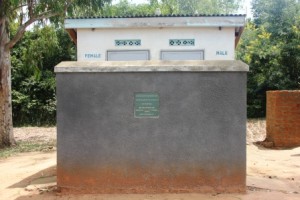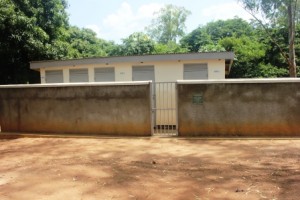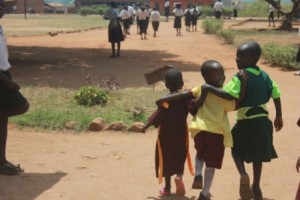Water, Hygiene & Sanitation (WASH) at Anaka
July 31, 2015 Here at African Revival, we don’t want to see anyone’s education go down the toilet! That’s why we have supported many of our partner schools through implementing safe water, hygiene and sanitation (WASH) initiatives, so that schools can meet their students’ most basic needs.
Here at African Revival, we don’t want to see anyone’s education go down the toilet! That’s why we have supported many of our partner schools through implementing safe water, hygiene and sanitation (WASH) initiatives, so that schools can meet their students’ most basic needs.
One of the schools whom we have supported in this area is Anaka P7 Primary School, one of our model schools – meaning that the standard of the school is now so high that it no longer needs our support in order to thrive. We have worked hard together to achieve this status, to ensure that the school excels in every way, including the bathroom facilities. Several years ago, the latrines in this large school were over-used, and threatened to over-fill and collapse. So, we set about building three new high quality latrine blocks for pupils and teachers.
 Firstly, dedicated and talented teachers are one of the pillars of a good school, and so we wanted to make sure that the staff at Anaka had access to adequate and comfortable facilities; this is why we constructed a teacher’s latrine block on the school’s premises. In addition, we also built five boys’ latrines, which have enabled the school’s younger pupils from P1 to P3 to use separate toilets from the older boys. Conveniently, the latrine block is located closer to their classrooms- so now their mid-class toilet dash is a very short one!
Firstly, dedicated and talented teachers are one of the pillars of a good school, and so we wanted to make sure that the staff at Anaka had access to adequate and comfortable facilities; this is why we constructed a teacher’s latrine block on the school’s premises. In addition, we also built five boys’ latrines, which have enabled the school’s younger pupils from P1 to P3 to use separate toilets from the older boys. Conveniently, the latrine block is located closer to their classrooms- so now their mid-class toilet dash is a very short one!
For the girls, attached to their new toilet block are also several washing and changing rooms, equipped with soap and basins. We built these facilities to help girls better manage their periods, and reduce absenteeism from class during their monthly cycles. The school’s fantastic head-teacher, Lily-Rose, has ensured that there is enough free time in class time-tables for girls to bathe and change when necessary, without compromising girls’ lesson attendance. She told us:
 “Class absenteeism among our girls has reduced, because they are comfortable at school and don’t fear because they have these facilities to help them. That is part of reason of why the dropout rates of girls have been completely reduced here. That isn’t the case at many schools where you will often find girls out of school, but not here anymore.”
“Class absenteeism among our girls has reduced, because they are comfortable at school and don’t fear because they have these facilities to help them. That is part of reason of why the dropout rates of girls have been completely reduced here. That isn’t the case at many schools where you will often find girls out of school, but not here anymore.”
Alongside the washing and changing facilities, the school has also held training sessions on how to manage periods, and keep a supply of sanitary items at school so that girls have access to everything they need during their periods. The senior woman teacher is happy to distribute these, and even lends spare uniforms when necessary.
Lily-Rose tells us that girls now know how to take care of themselves during their periods, which has built up their confidence as they grow into young women. As you can tell, the provision of latrines and washing rooms serves a greater purpose than just biological imperatives; these facilities also contribute to keeping children – especially girls – in school, so that they can fully complete their education with dignity.

